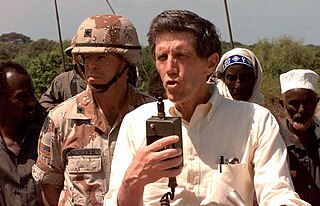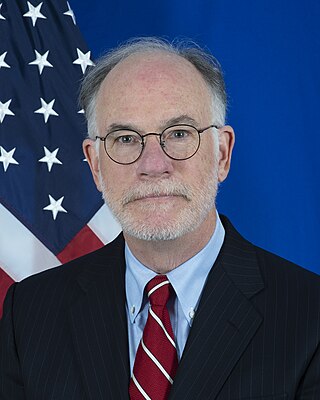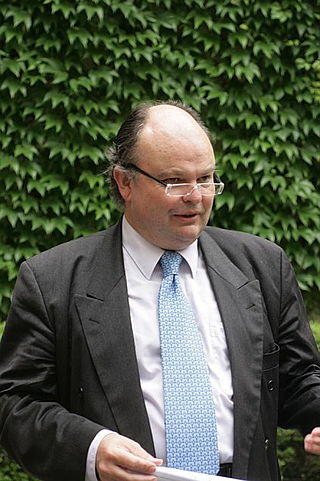
Adolph Dubs, also known as Spike Dubs, was an American diplomat who served as the United States Ambassador to Afghanistan from May 13, 1978, until his death in 1979. He was killed during a rescue attempt after his kidnapping.

The Paul H. Nitze School of Advanced International Studies (SAIS) is a graduate school of Johns Hopkins University based in Washington, D.C. with campuses in Bologna, Italy and Nanjing, China.

Turki bin Faisal Al Saud is a Saudi prince and former government official who served as the head of Saudi Arabia's General Intelligence Presidency from 1979 to 2001. He is the chairman of the King Faisal Foundation's Center for Research and Islamic Studies.

John Gunther Dean was an American diplomat. From 1974 to 1988, he served as the United States ambassador to five nations under four American presidents.

Robert Bigger Oakley was an American diplomat whose 34-year career (1957–1991) as a Foreign Service Officer included appointments as United States Ambassador to Zaire, Somalia, and Pakistan and, in the early 1990s, as a special envoy during the American involvement in Somalia.
Karl Frederick Inderfurth is an American diplomat. He was the assistant secretary of state for South Asian affairs from August 1997 to January 2001. In his capacity as assistant secretary, Inderfurth was responsible for US policy regarding Afghanistan, Bangladesh, Bhutan, India, Maldives, Nepal, Pakistan, and Sri Lanka. Prior to his appointment as assistant secretary, Inderfurth served as the U.S. representative for special political affairs to the United Nations, with the rank of ambassador. In this capacity, he dealt with issues such as UN peacekeeping, disarmament, nuclear proliferation and security affairs. Inderfurth also served as deputy U.S. representative on the United Nations Security Council.

Ross L. Wilson is an American diplomat who was the chargé d'affaires of the United States to Afghanistan from 2020 to 2021. He was the U.S. ambassador to Turkey from 2005 to 2008 and the U.S. ambassador to Azerbaijan from 2000 to 2003, with the personal rank of minister-counselor. He also teaches part-time at Carleton College. Wilson also previously served as director of the Dinu Patriciu Eurasia Center at the Atlantic Council.
Robert Vossler Keeley had a 34-year career in the Foreign Service of the United States, from 1956 to 1989. He served three times as Ambassador: to Greece (1985–89), Zimbabwe (1980–84), and Mauritius (1976–78). In 1978–80 he was Deputy Assistant Secretary of State for African Affairs, in charge of southern and eastern Africa.
Osman Faruk Loğoğlu is a Turkish diplomat and the former Turkish ambassador to the United States of America, having served from 2001 to 2005.

Francis Joseph Ricciardone Jr. is a former President of the American University in Cairo. Ambassador Ricciardone was the United States ambassador to Turkey between 2011 and 2014. Previously he was Deputy Ambassador at the U.S. Embassy in Kabul, Afghanistan. He was also on leave from the U.S. Department of State as a guest scholar at the U.S. Institute of Peace. He has served as U.S. Ambassador to the Arab Republic of Egypt (2005–2008), the Republic of the Philippines and the Republic of Palau (2002–2005). As a career member of the Senior Foreign Service, he received U.S. government and other organization awards for his work in foreign policy and program management, political reporting and analysis, and peacekeeping.

William Henry Luers is a retired American career diplomat and museum executive. He is the director of the Iran Project. In addition to a thirty-one-year career in the Foreign Service, Luers has served as a U.S. Navy officer, as president of the Metropolitan Museum of Art in New York City, and as president of the United Nations Association of the United States of America. Luers is an adjunct professor at the School of International and Public Affairs at Columbia University.

Nicholas Alexander Veliotes is a former United States Foreign Service Officer and diplomat. He served as United States Ambassador to Jordan (1978–81) and Egypt (1984–86). He is a member of the American Academy of Diplomacy and Council on Foreign Relations.
Heath Ward Lowry is the Atatürk Professor of Ottoman and Modern Turkish Studies emeritus at Princeton University and Bahçeşehir University. He is an author of books about the history of the Ottoman Empire and Modern Turkey.
Owen W. Roberts was an American diplomat who served as the United States Ambassador to Togo from June 28, 1984, to July 5, 1986.

Robert W. Jordan is an American lawyer and diplomat. He served as the United States Ambassador to Saudi Arabia from 2002 to 2003, under President George W. Bush.

Wolfgang Franz Danspeckgruber is the Founding Director of the Liechtenstein Institute on Self-Determination at Princeton University and has been teaching on issues of state, international security, self-determination, diplomacy, and crisis diplomacy at Princeton's Woodrow Wilson School of Public and International Affairs and the Department of Politics since 1988. He is also founder and chair of the Liechtenstein Colloquium on European and International Affairs, LCM, a private diplomacy forum.

Morton Isaac Abramowitz is an American diplomat and former U.S. State Department official. Starting his overseas career in Taipei, Taiwan after joining the foreign service, he served as U.S. Ambassador to Thailand and Turkey and as the Assistant Secretary of State for Intelligence and Research. He retired from the State Department with the rank of Career Ambassador. He then became president of the Carnegie Endowment for International Peace and founded the International Crisis Group.

The 1973 Afghan coup d'état, also called by Afghans as the Coup of 26 Saratan and self-proclaimed as the Revolution of 26 Saratan 1352, was led by Army General and prince Mohammad Daoud Khan against his cousin, King Mohammad Zahir Shah, on 17 July 1973, which resulted in the establishment of the Republic of Afghanistan under a one-party system led by Daoud Khan.
The relations between the Ottoman Empire and the United States have a long history having its roots even before the American independence since there was actually a running trade between these two regions. After the American independence in 1776, the first relations between these two countries started through the contact between the American merchants, statesmen and lastly the Navy and North African countries and with the Ottoman Empire after 1780.














